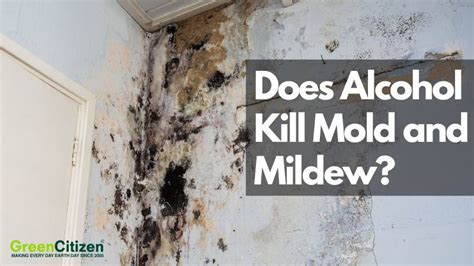Alcohol has been widely recognized for its disinfectant properties, and one of its most useful applications is in killing mold. Mold is a type of fungus that can grow on various surfaces, including walls, ceilings, and furniture, and can cause a range of health problems, from allergic reactions to respiratory issues. In this article, we will explore the five ways alcohol can be used to kill mold.
Understanding the Basics of Mold
Before we dive into the ways alcohol can kill mold, it's essential to understand the basics of mold. Mold is a type of microorganism that feeds on organic matter, such as cellulose, protein, and other nutrients. It thrives in damp environments with poor ventilation and can grow rapidly on surfaces that are exposed to moisture. There are many types of mold, but some of the most common ones include Aspergillus, Cladosporium, and Penicillium.

5 Ways Alcohol Kills Mold
Alcohol is a potent disinfectant that can be used to kill mold in various ways. Here are five effective methods:
1. Denaturation of Proteins
Alcohol works by denaturing the proteins in mold cells, ultimately leading to their death. When alcohol comes into contact with mold cells, it disrupts the protein structure, causing the cells to lose their shape and function. This makes it impossible for the mold cells to reproduce and grow, effectively killing them.
2. Disruption of Cell Membranes
Alcohol can also disrupt the cell membranes of mold cells, causing them to lose their integrity and eventually die. The cell membrane is a critical component of the mold cell, responsible for regulating the flow of nutrients and waste products. When the cell membrane is disrupted, the mold cell is unable to function properly, leading to its death.

3. Dehydration of Mold Cells
Alcohol can also dehydrate mold cells, causing them to shrink and eventually die. When alcohol is applied to mold cells, it absorbs the moisture from the cells, causing them to lose their water content. Without water, the mold cells are unable to function and eventually die.
4. Inhibition of Mold Growth
Alcohol can also inhibit the growth of mold by preventing the production of spores. Spores are the reproductive structures of mold, responsible for producing new mold cells. When alcohol is applied to mold cells, it prevents the production of spores, effectively inhibiting the growth of mold.
5. Killing of Mold Spores
Finally, alcohol can also kill mold spores, which are the reproductive structures of mold. Mold spores are highly resistant to disinfectants, but alcohol is effective in killing them. When alcohol is applied to mold spores, it denatures the proteins in the spores, causing them to lose their shape and function.

Precautions When Using Alcohol to Kill Mold
While alcohol is effective in killing mold, there are some precautions to take when using it. Here are some tips:
- Always wear protective gear, such as gloves and a mask, when handling mold.
- Make sure the area is well-ventilated to prevent the buildup of fumes.
- Use a diluted solution of alcohol, as undiluted alcohol can be too harsh on surfaces.
- Avoid using alcohol on surfaces that are sensitive to it, such as wood or fabric.

Gallery of Mold Removal






Frequently Asked Questions
Can I use alcohol to kill mold on all surfaces?
+No, you should not use alcohol on all surfaces. Some surfaces, such as wood or fabric, may be damaged by alcohol. Always test a small area first to ensure the surface is not damaged.
How long does it take for alcohol to kill mold?
+It typically takes 10-15 minutes for alcohol to kill mold. However, the exact time may vary depending on the concentration of the alcohol solution and the type of mold.
Can I use alcohol to prevent mold growth?
+Yes, you can use alcohol to prevent mold growth. Applying a diluted solution of alcohol to surfaces can help prevent mold from growing in the first place.
In conclusion, alcohol is a potent disinfectant that can be used to kill mold in various ways. By understanding the basics of mold and the ways alcohol can be used to kill it, you can effectively remove mold from your home or business. Remember to always take precautions when handling mold and to use a diluted solution of alcohol to avoid damaging surfaces.
